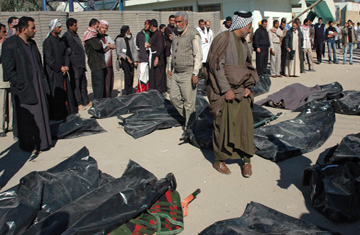
Iraqi Shi'ites search for their relatives among dead bodies at the Hilla hospital morgue, central Baghdad, March 7, 2007. A car bomb today killed seven policemen deployed to protect Shi'ite pilgrims and a civilian in a Sunni district of southern Baghdad, a security official said.
At a press conference last week, Gen. David Petraeus, the new U.S. commander in Iraq, was asked if the Mahdi Army might have a legitimate role in protecting Shi'ite gatherings. Petraeus seemed to suggest that such a solution might eventually be acceptable to the U.S. "You know, many of... the coalition countries have a variety of auxiliary police or other functions," Petraeus said guardedly. "The challenge, of course, is that some of these organizations have participated in true excesses, and they have been responsible, some of them, some the extremist elements of them — and I think that the challenge has been to determine, you know, how do you incorporate those who want to serve... in a positive way, and as neighborhood watches, let's say, but unarmed in our own communities, but without turning into something much more than that?"
Ambassador David Satterfield, Secretary of State Condoleezza Rice's special advisor on Iraq, answered the same question with a sharp "No."
"I do not believe," Satterfield said, "that one can ascribe to the behavior of the Jaish al-Mahdi [Mahdi Army] or other groups that were engaged in violence this noble self-help neighborhood protection motive. They were murders and they're being confronted."
Satterfield added that he believed the string of suicide bombings that killed dozens of pilgrims represented "a stepped-up effort by the al-Qaeda terror campaign, by elements of the Sunni insurgency, in trying to thwart the Baghdad security plan by inflaming sectarian violence, by provoking the death squads back into action."
There's merit to the points made by both Petraeus and Satterfield, according to Antony Cordesman, a military strategy expert with Washington's Center for Strategic and International Studies.
"In the long run, a stable Iraq cannot have extremists in the Mahdi Army act on their own against the Sunnis, the Coalition, or the government," Cordesman told TIME. "In the short run, the key priority for military operations is to build security as soon as possible, avoid unnecessary confrontations with the Mahdi Army and militias [and] focus on active threats, whether Sunni or Shi'ites. This is a search for least bad options that have many conflicting priorities, and the best possible solution is going to be messy, involve contradictory priorities, and force the U.S. to constantly adapt to the realities of Iraq politics."
Does the difference in tone suggest a split within the Bush Administration? Not really, says Cordesman. "I think they are speaking to different constituencies, and with different priorities," he explains. "There is going to be a lot of good cop-bad cop, and tactics vs. strategic rhetoric coming out of U.S. officers and officials simply because that is what their jobs require."
Satterfield spoke to reporters in Washington and seemed to be talking primarily to Americans. He said he'd seen one glimmer of good news since the Baghdad security crackdown began: the level of sectarian execution-style killings was "to the lowest level since early spring of last year," he said. "That's a positive thing, but it needs to be sustained."
Petraeus, on the other hand, seemed to be addressing Iraqis and Arabs. Many of Iraq's top leaders have repeatedly said that they view the militias as being a kind of neighborhood watch — with some bad apples who do terrible things. The evidence that some Shi'ite fighters engage in systematic kidnapping, torture and execution of Sunnis suggests that's wishful thinking, but that's what they claim. Petraeus knows this and has to calibrate what he says accordingly.
